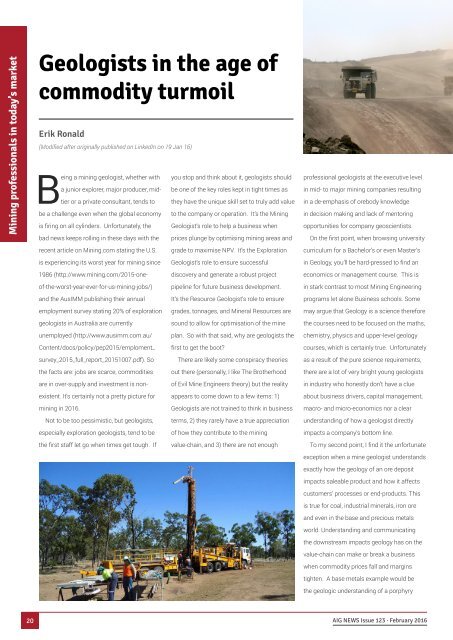Up & Coming Geoscientists - a sample of our AIG Honours Bursary Recipients
KMnJLq
KMnJLq
Create successful ePaper yourself
Turn your PDF publications into a flip-book with our unique Google optimized e-Paper software.
Mining pr<strong>of</strong>essionals in today’s market<br />
Geologists in the age <strong>of</strong><br />
commodity turmoil<br />
Erik Ronald<br />
(Modified after originally published on LinkedIn on 19 Jan 16)<br />
Being a mining geologist, whether with<br />
a junior explorer, major producer, midtier<br />
or a private consultant, tends to<br />
be a challenge even when the global economy<br />
is firing on all cylinders. Unfortunately, the<br />
bad news keeps rolling in these days with the<br />
you stop and think about it, geologists should<br />
be one <strong>of</strong> the key roles kept in tight times as<br />
they have the unique skill set to truly add value<br />
to the company or operation. It’s the Mining<br />
Geologist’s role to help a business when<br />
prices plunge by optimising mining areas and<br />
pr<strong>of</strong>essional geologists at the executive level<br />
in mid- to major mining companies resulting<br />
in a de-emphasis <strong>of</strong> orebody knowledge<br />
in decision making and lack <strong>of</strong> mentoring<br />
opportunities for company geoscientists.<br />
On the first point, when browsing university<br />
recent article on Mining.com stating the U.S.<br />
is experiencing its worst year for mining since<br />
1986 (http://www.mining.com/2015-one<strong>of</strong>-the-worst-year-ever-for-us-mining-jobs/)<br />
and the AusIMM publishing their annual<br />
employment survey stating 20% <strong>of</strong> exploration<br />
geologists in Australia are currently<br />
unemployed (http://www.ausimm.com.au/<br />
Content/docs/policy/pep2015/emploment_<br />
survey_2015_full_report_20151007.pdf). So<br />
the facts are: jobs are scarce, commodities<br />
are in over-supply and investment is nonexistent.<br />
It’s certainly not a pretty picture for<br />
mining in 2016.<br />
Not to be too pessimistic, but geologists,<br />
especially exploration geologists, tend to be<br />
the first staff let go when times get tough. If<br />
grade to maximise NPV. It’s the Exploration<br />
Geologist’s role to ensure successful<br />
discovery and generate a robust project<br />
pipeline for future business development.<br />
It’s the Res<strong>our</strong>ce Geologist’s role to ensure<br />
grades, tonnages, and Mineral Res<strong>our</strong>ces are<br />
sound to allow for optimisation <strong>of</strong> the mine<br />
plan. So with that said, why are geologists the<br />
first to get the boot?<br />
There are likely some conspiracy theories<br />
out there (personally, I like The Brotherhood<br />
<strong>of</strong> Evil Mine Engineers theory) but the reality<br />
appears to come down to a few items: 1)<br />
Geologists are not trained to think in business<br />
terms, 2) they rarely have a true appreciation<br />
<strong>of</strong> how they contribute to the mining<br />
value-chain, and 3) there are not enough<br />
curriculum for a Bachelor’s or even Master’s<br />
in Geology, you’ll be hard-pressed to find an<br />
economics or management c<strong>our</strong>se. This is<br />
in stark contrast to most Mining Engineering<br />
programs let alone Business schools. Some<br />
may argue that Geology is a science therefore<br />
the c<strong>our</strong>ses need to be focused on the maths,<br />
chemistry, physics and upper-level geology<br />
c<strong>our</strong>ses, which is certainly true. Unfortunately<br />
as a result <strong>of</strong> the pure science requirements,<br />
there are a lot <strong>of</strong> very bright young geologists<br />
in industry who honestly don’t have a clue<br />
about business drivers, capital management,<br />
macro- and micro-economics nor a clear<br />
understanding <strong>of</strong> how a geologist directly<br />
impacts a company’s bottom line.<br />
To my second point, I find it the unfortunate<br />
exception when a mine geologist understands<br />
exactly how the geology <strong>of</strong> an ore deposit<br />
impacts saleable product and how it affects<br />
customers’ processes or end-products. This<br />
is true for coal, industrial minerals, iron ore<br />
and even in the base and precious metals<br />
world. Understanding and communicating<br />
the downstream impacts geology has on the<br />
value-chain can make or break a business<br />
when commodity prices fall and margins<br />
tighten. A base metals example would be<br />
the geologic understanding <strong>of</strong> a porphyry<br />
20<br />
<strong>AIG</strong> NEWS Issue 123 · February 2016


